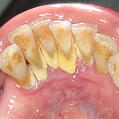 Gum disease can be caused by a number of factors, but poor oral hygiene is the most common cause. If you do not brush your teeth properly or regularly, plaque can build up on your teeth. Plaque will irritate your gums leading to red and sore gums. If left untreated, gum disease can cause serious problems.
Gum disease can be caused by a number of factors, but poor oral hygiene is the most common cause. If you do not brush your teeth properly or regularly, plaque can build up on your teeth. Plaque will irritate your gums leading to red and sore gums. If left untreated, gum disease can cause serious problems.How is Plaque formed?
The bacteria in your mouth combines with small food particles and saliva to form a sticky film known as plaque. When you eat sugary or starchy foods, the bacteria in plaque turn the carbohydrates into energy and produce acid. The acid begins to break down your tooth's surface causing tooth decay.
The bacteria can also irritate your gums, causing inflamed gums.
How do you remove plaque?
Plaque is usually easy to remove by brushing and flossing your teeth. If you do not remove plaque it can harden and form a substance called tartar. Tartar sticks much more firmly to your teeth than plaque and can usually only be removed by a dentist or dental hygienist.
If plaque is left untreated the gum may start to come away from the tooth, creating 'pockets' around the tooth where even more plaque can grow. Over time, these pockets deepen, your gums continue to recede and your teeth can become loose.
What is Gum Disease?
Inflammation of your gums that can progress to affect the bone that surrounds and supports your teeth
There are two main stages:
Healthy Gums - Healthy gums are firm and don't bleed. They fit snugly around individual teeth
|
Gingivitis:
|
|
Periodontitis – At this stage your gums begin to separate and recede from your teeth. This allows plaque to move toward the roots, affecting supporting deeper tissues and bone. In the final stages of gum disease, the bone supporting your teeth are destroyed. This may cause your teeth to become loose and can affect how well you can chew your food. Your Dentist may need to extract affected teeth. |
How Do I Know if I Have Gum Disease?
Gum disease can occur at any age, but it is most common amongst adults. If detected in its early stages, gum disease can be reversed - so see your dentist if you notice any of the following symptoms:
- Gums that are red, puffy or swollen, Gums that bleed during brushing or flossing
- Teeth that look longer because your gums have receded
- Gums that have separated, or pulled away, from the necks of your teeth, creating a pocket
- Changes in the way your teeth fit together when you bite
- Pus coming from between your teeth and gums
- Persistent bad breath or a bad taste in your mouthThe early stages of gum disease can often be reversed with effective brushing and flossing. Good daily oral hygiene will help keep plaque from building up.
The early stages of gum disease can often be reversed with effective brushing and flossing. Good daily oral hygiene will help keep plaque from building up.
Dental deep cleaning by your hygienist is the only way to remove plaque that has built up and hardened into tartar. Your dentist will clean or your teeth to remove the tartar above and below the gumline.
If your gum condition is more severe, you may require surgery. Remember, after successful treatment, you still need to take extra care of your gums to make sure gum infection doesn’t come back.
The best way to look after your gums is by visiting your dentist at regular intervals.
20/20 Dental Practice provides treatment for bleeding gums in Newbury. Ask us how to treat gum disease Newbury.



.png?width=320&name=Request%20(1).png)
